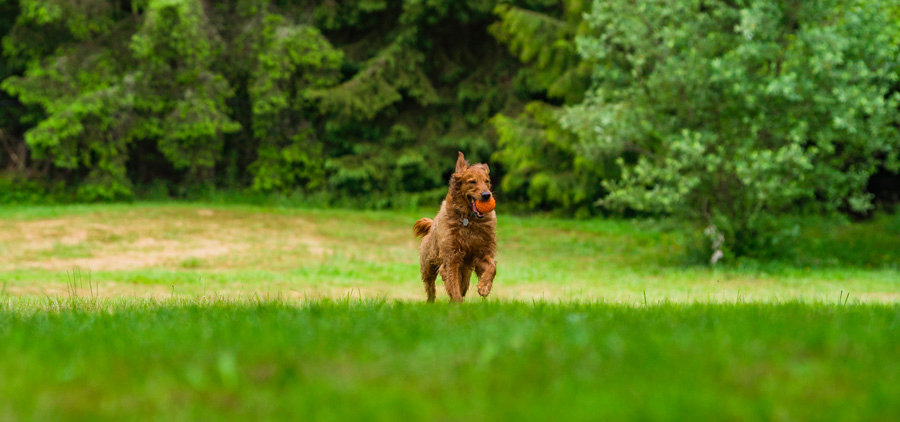How to Socialize a Reactive Puppy Safely

* All Sniffspot articles are reviewed by certified trainers for quality, please see bottom of article for details *
Bringing home a new puppy is pure joy, but amidst the excitement, remember socialization. It's the key to raising a confident, well-adjusted dog. A poorly socialized pup can become a reactive dog, and that can be tough. This guide covers everything from the critical socialization window to navigating public spaces and even how to socialize a reactive dog, should the need arise. We'll give you practical advice and equip you with the tools to nurture a happy, well-behaved companion.
What is puppy socialization?
Socialization essentially refers to the process of preparing your dog to be comfortable with the world around them. Whether interacting with other dogs, passing people on the street during a walk, joining their pet parents for lunch at a restaurant, or simply welcoming visitors into their homes and yards, a well-socialized dog has positive associations with a range of experiences — and that makes them better able to handle a wide variety of situations than a puppy who didn’t get enough positive experiences as they developed.
Socialization involves exposing your new dog to a range of stimuli — and supporting them as you do, so they’re able to learn normal everyday things that could come across as scary (like the vacuum cleaner or restaurant banners blowing in the wind) really aren’t a big deal.
Key Takeaways
- Early and ongoing socialization is crucial: Begin socializing your puppy as early as possible, ideally between birth and 16 weeks old, and continue exposing them to new experiences throughout their life. Focus on positive interactions to build confidence and adaptability.
- Prioritize safe socialization practices: Use controlled environments, especially before your puppy is fully vaccinated. Consider puppy classes with reputable trainers and avoid uncontrolled interactions with unknown dogs. Always observe your dog's body language for signs of stress.
- Sniffspot facilitates safe and controlled socialization: Private dog parks on Sniffspot offer a secure environment where you can manage interactions and tailor the experience to your puppy's individual needs.
Why proper socialization is so important for your puppy
Dogs are naturally social creatures who evolved from canine ancestors who live in group settings. Although most domestic dogs today don’t live with lots of other dogs full time, they do live with humans — and it’s important they know how to fit into the society we’ve established!
A thoughtful puppy socialization process is important for many reasons:
- A properly socialized puppy has a better understanding of boundaries and manners with different types of people and among other animals, which is important for future behavior as they grow up.
- Dogs socialized with each other are often less prone to fear, aggression, and insecurity, which can manifest in dangerous ways.
- Canines learn much of what they carry into adulthood during their first three months of life. This is why early initial socialization is encouraged by pet professionals!
- Socializing your puppy not only allows you to enjoy more experiences with your canine best friend throughout the course of their life — it’s important to realize that the reason a well-socialized dog can do more things is because they feel confident and secure. That’s something every owner wants, regardless of whether or not you actually plan to frequent dog-friendly patios or public dog parks!

When should you start socializing your puppy?
Like children, puppies are sponges in their early ages — which makes them ripe for learning and retaining good habits, lifestyle behaviors, and obedience training cues. Unpleasant experiences during this crucial phase can stay with a puppy well into adulthood, which is why exposing your young dog to as many stimuli as possible in the safest and most supported way will result in an adult dog who is able to handle everyday situations without signs of fear or aggression.
But when exactly should you start socializing your puppy? Do you need to wait until they’ve had all of their puppy vaccinations?
The short answer: Socialize your puppy as early as possible!
Preventative Vet states that the ages in which a puppy will get the most out of socialization is between birth and 12 to 16 weeks of age. This period is known as the puppy socialization window. Most puppies are ideally kept with their mothers and littermates for at least the first eight weeks of this time, in which valuable lessons and experiences take place. Basic social skills like setting and respecting boundaries, learning how to play, and understanding body language happen during this time — and once they come home with you, it’s your job to continue that education as they develop.
What about health risks with early socialization?
While early socialization is best for your dog’s long-term confidence and comfort in our human world, your pet’s health is also important. Most puppies begin receiving vaccination series at around eight weeks of age, which continue until around the 16 week mark — at which point a puppy is considered to be fully safe and protected from diseases like parvo and distemper.
Before puppies are fully vaccinated it is strongly advised that they not be taken into public spaces crowded with lots of other animals, like dog parks or day care centers, for socialization. The American Veterinary Society of Animal Behavior does recommend that puppies should begin socializing before they are fully vaccinated, though, and suggests structured puppy socialization classes with reputable trainers as opposed to free-for-all get togethers in unmonitored spots.
While some tools for socialization — like attending busy puppy play dates or visiting doggy day care centers — are not recommended until your dog has fully completed their vaccinations, that doesn’t mean you need to stay home to avoid infectious disease. More on safe socialization in the next section!

How to socialize your puppy safely
Like any aspect of dog training or conditioning, there are specific things that are and are not recommended in order to see the best results. Improper socialization can have worse negative effects than a simple lack of socialization.
Consider a structured puppy socialization class
Some puppy training classes offer admittance after your dog has received their first set of shots and may provide for a safe, controlled atmosphere for a young dog to learn in. “I take puppies in my classes if they’ve had one set of shots, but I keep a clean room, don’t let sick dogs come to class, and tell folks not to do dog parks at this time,” says Shannon Freed, operator of AnimalKind Training in Stanwood, Washington.
We recommend looking for a positive reinforcement, or force free, trainer near you.
Avoid letting your puppy come in contact with contaminated surfaces
Many dog parents choose to hold their puppy when bringing them out in public. You can also use tools like blankets or bags to keep them from touching the ground. These small efforts can help you strike a happy medium of exposing your dog to the world around them without putting them at undue risk for illness before they’re fully vaccinated.
Make experiences positive!
Consider rewarding your puppy with a treat in each new situation during your socialization sessions, like if they see a new person or object for the first time. Dogs learn by association and consequence. Allowing them to associate new experiences — especially ones that you expect they will encounter regularly throughout their lifetime — with food, a favorite toy, or your praise can help them know that these are safe situations with positive emotions and not anything to be afraid of.
An important note here: While food and toys can be a great way to build happy emotions in new socialization settings, be careful not to use rewards to coerce your dogs into things they aren’t comfortable with. If your puppy seems uncertain about a new thing, like an unfamiliar statue or a particularly tall person? Don’t lure them towards it with treats! This can create a sense of conflict that only heightens the negative emotions, especially if your dog decides to approach to receive the food and is then startled to find themselves so close.
Watch your dog’s body language
Watch your puppy’s body language for signs of stress. Generally, it’s best to keep socialization outings short — this keeps your puppy engaged for just long enough to not become frustrated by the process.
You can read more about reading your dog’s body language in this article.
Err on the side of caution when in doubt
Do your best to avoid putting your puppy in unsafe situations or exposing them to unknown people, places, or things that may traumatize them. Dogs who have unpleasant experiences early in life tend to carry those associations with them into adulthood, which only become harder to change over time. Prioritize structured interactions with people, dogs, and environments you trust rather than greetings with complete strangers.
Know that socialization isn’t “one and done”
Don’t assume your puppy is “socialized” just because they’ve encountered a situation one time. Socialization is an ongoing process that should be a regular part of your dog’s life throughout the years! Always be aware of your dog’s comfort when introducing them to other dogs, people, or places.

Finding safe spaces for socialization on Sniffspot
Private dog parks on Sniffspot can offer a controlled environment
If you’re looking for a safe, controlled environment to socialize your puppy, especially before they’ve completed their vaccinations, Sniffspot can be a great option. Unlike public dog parks, Sniffspot offers private dog parks where you can book time slots, ensuring a limited number of dogs are present. This controlled environment helps prevent your puppy from feeling overwhelmed and allows for positive interactions with other dogs in a more manageable setting. This is especially helpful for puppies still learning social cues or dogs who may be reactive in larger, more chaotic environments. You can even find hosts on Sniffspot who offer one-on-one socialization sessions with their own friendly, balanced dogs.
Search for Sniffspots with specific amenities to suit your dog's needs
Sniffspot allows you to tailor the socialization experience to your dog’s specific needs. You can search for Sniffspots with specific amenities, such as agility equipment if you’re working on confidence building, or shaded areas for hot days. If your dog enjoys water, you can even find Sniffspots with water features. This customization can enhance the socialization process, making it more effective and enjoyable for both you and your puppy. For example, if your puppy is nervous around other dogs, you can start by booking a smaller, fenced-in Sniffspot and gradually introduce interactions with a calm, known dog under controlled conditions, as recommended by the Whole Dog Journal. This helps build your puppy’s confidence and creates positive associations with new experiences.
Puppy socialization checklists
To make things easy, professional dog trainers like Dr. Sophia Yin have created different puppy socialization checklists. These cover a number of people, places, things, and experiences you can expose your puppy to when they’re young.
Dr. Yin’s checklist is broken down into sections, with each one designed to take place over the course of a week during the ideal puppy socialization window time frame. They include things like:
- Handling: touching the ears, feet, etc
- Unfamiliar people: people in glasses, hats, people with canes, loud children, etc
- Unfamiliar dogs: always look to introduce your puppy to a dog who plays well during this time
- Other animal species: cats, livestock, etc
- New surfaces: concrete, slippery floor surfaces, grass, etc
- Scary sounds: delivery trucks, vacuums, etc
- Objects with wheels: skateboards, shopping carts, bikes, etc
- Man-made objects: umbrellas, plastic bags on the street, etc
- New environments: inside buildings, a busy city street, etc
While we do recommend getting out and about with your dog as soon as you can, much of this checklist can also be complete inside and around your own home. Here, you can introduce your dog to sounds like doorbells and vacuums, surfaces like grass and cement, and safe visitors.
Once your puppy is vaccinated, playdates with other well-socialized dogs along with walks around the neighborhood all provide great settings for a puppy to become accustomed to life outside of the home. Sniffspot hosts also offer safe, private locations for dogs to socialize in safely!
Final things to keep in mind about puppy socialization
It’s a great idea to work with a trainer you trust!
When socializing your puppy, you can always only do your best, and no one will do it perfectly. That said, trainers and organized classes, like designated puppy socialization courses, can give your puppy their best shot at learning about the world in a healthy way that will benefit them over the course of their life.
Consult your veterinarian and trainer if you’re worried
When socializing in groups, or taking your puppy out in public, be sure to keep their vaccination schedule in mind, and consult your vet or a trainer if you’re unsure whether it is safe for your puppy to venture out.
Remember that not every environment is an ideal puppy socialization setting
Be aware that not all social situations will make for proper settings for a puppy to become socialized. For example: Many people assume that a community dog park can make for a great space for a puppy to learn the ins and outs of canine behavior — but dog parks can be very overwhelming, especially for young dogs.
When undersocialized dogs are met with a dog who is reactive, acts as a bully, or worse, is outright aggressive, these negative experiences can form lasting impressions, and can teach them to fear certain situations.
Instead, work slowly in smaller groups, either led by a pro or filled with dogs and people you trust, who will provide safety and structure when socializing your best friend.
Trainer Reviews of this Article
There is so much misinformation out there, we want to make sure we only provide the highest quality information to our community. We have all of our articles reviewed by qualified, positive-only trainers.
These are the trainers that reviewed this article:
Erica Marshall CPDT-ka, CDBC
Owner/Trainer of Wicked Good Dog Training in Christiana TN
Author of “New Puppy, Now What?”
www.wickedgooddogtraining.com
Shannon Finch
AnimalKind Training
M.Ed. Humane Education
Karen Pryor Academy Certified Training Partner
Certified Tellington TTouch and TTEAM Practitioner
Related Articles
Frequently Asked Questions
My puppy is scared of everything. Is it too late to socialize them?
It's never too late to start working on building your dog's confidence! While the prime socialization window is during puppyhood, adult dogs can still learn and adapt. Focus on creating positive associations with things that scare them, starting slowly and at a distance. A certified professional dog trainer or behaviorist can offer personalized guidance.
Is it okay to socialize my puppy before they've had all their shots?
Yes, it's actually crucial to start socializing your puppy before they are fully vaccinated. However, you need to be careful about where they socialize. Avoid places with lots of unknown dogs, like dog parks, until their vaccinations are complete. Instead, opt for controlled environments like puppy classes, visits to the homes of friends with healthy, vaccinated dogs, or one-on-one playdates with known, friendly dogs.
My puppy had a bad experience with another dog. What should I do?
Don't panic! A single negative experience doesn't have to define your puppy's future interactions. Avoid putting them in the same situation again right away. Instead, gradually reintroduce them to other dogs in a controlled, positive setting, perhaps with a very calm and friendly dog. If the fear persists, consult a certified trainer or behaviorist.
What are some easy ways to socialize my puppy at home?
Even before venturing out, you can do a lot of socialization at home! Get your puppy used to different sounds by playing recordings of things like traffic, thunderstorms, or fireworks at a low volume. Invite friends and family over to help them get comfortable with new people. Introduce them to a variety of surfaces like carpet, tile, and grass. Even simple things like handling their paws and looking in their ears can help prepare them for vet visits.
How can I tell if my puppy is overwhelmed during socialization?
Pay close attention to your puppy's body language. Signs of stress can include tucked tails, flattened ears, lip licking, yawning, whale eye (showing the whites of their eyes), panting, and pacing. If you see these signs, remove your puppy from the situation and give them a break. It's always better to err on the side of caution and end a socialization session early than to push your puppy too far.
Most recent articles
Related articles
Top dog guides per area
Dog training guides

Dog Food Aggression: Why You Shouldn't Punish It
Does your dog ever growl when you walk by their food dish? Maybe they get possessive of treats, carrying them far away and giving you side-eye when you start to approach — or snarling at your other pets or children if they get too close.

Best Dog Fields in the US: 25+ Wide-Open Spaces for Your Pup to Run Free
The best dog fields in the US offer something that traditional enclosed parks simply can't match: acres of open space where your pup can truly stretch their legs and run at full speed. From Colorado's 470-acre prairie meadows to Tennessee's award-winning "Outback," these wide-open spaces allow dogs to roam, explore, and exercise naturally while engaging instincts that cramped urban parks suppress.

The Ultimate Guide to Scent Training for Dogs
Your dog's nose is an amazing tool. Did you know they have 40 times the olfactory receptors than humans? Scent training for dogs taps into this superpower, turning everyday moments into exciting sniff-fests. It's enriching for all types of dogs – reactive, shy, or simply adventurous. Ready to explore the world of scent work for dogs? Let's get started.

Service Dog Training Costs: DIY vs. Pro
More than 80 million Americans rely on their service dogs to help them navigate the world. Task-trained assistance animals perform a huge range of life-changing—in many cases, life-saving—services: These dogs act as eyes for visually impaired handlers, provide mobility support, alert to seizures and blood sugar crashes, interrupt anxiety attacks, remind their people to take medications, and so much more.

How to Deal With Puppy Potty Training Regression
You thought those dreaded middle-of-the-night potty breaks were over. You were finally free from cleaning up puppy puddles. Then, suddenly, your furry friend starts having accidents again. It's frustrating, right? This puppy potty training regression is more common than you think. Don't worry; we'll help you get your pup back on track. We'll cover the common causes, offer practical solutions, and give you actionable steps to tackle this challenge together.

Dirty Dog Syndrome: Causes, Solutions, and Prevention
It's a cringe-worthy moment every dog owner dreads: your furry friend chowing down on something truly disgusting. If your dog has a penchant for poop, you're dealing with coprophagia. It's more common than you think, and thankfully, often manageable. This article explores the reasons behind dirty dog syndrome, from instinct to learned behavior. We'll also give you practical tips to help break this unpleasant habit.

How to Train Your Rescue Dog: A Complete Guide
* All Sniffspot articles are reviewed by certified trainers for quality, please see bottom of article for details *
Dog enrichment guides

Best Dog Water Parks in the US: 15+ Amazing Splash Destinations for Your Pup
Do you have a water-loving dog looking to burn some energy? There are countless dog parks to visit throughout our country — but some of them become far too hot in the midday sun to be safe for your pets to play. That’s why we’ve put together a list of some of the best dog water parks throughout the United States! At these locations, your pup can frolic, splash, and swim to their heart’s content.

Best Dog Fields in the US: 25+ Wide-Open Spaces for Your Pup to Run Free
The best dog fields in the US offer something that traditional enclosed parks simply can't match: acres of open space where your pup can truly stretch their legs and run at full speed. From Colorado's 470-acre prairie meadows to Tennessee's award-winning "Outback," these wide-open spaces allow dogs to roam, explore, and exercise naturally while engaging instincts that cramped urban parks suppress.

Best Toys for Herding Dogs: Keeping Your Pup Happy & Engaged
Herding dogs are amazing, intelligent companions. But that also means they need more than just a simple game of fetch. Finding the right toys for herding dogs is key to keeping them happy and stimulated. This article explores some of the best toys for herding dogs, including options specifically for breeds like Border Collies and Australian Shepherds. We'll help you discover the perfect herding toys for dogs to tap into their natural instincts and keep them entertained for hours.

Tough Dog Toys for Aggressive Chewers: A Practical Guide
Does your dog destroy every toy you give them? Is your house littered with the remnants of plush toys? Are you tired of wasting money on "indestructible" dog toys for aggressive chewers that don't last? Then this post is for you. We'll cover everything you need to know about finding the best dog toys for aggressive chewers, so you can finally give your pup something safe, durable, and fun.

Daily Exercise Calculator: How Much Exercise Does Your Dog Need?
Everyone knows dogs need exercise, but how much is enough? Walks are great, but creating a truly balanced fitness plan means understanding your dog's specific needs. This post helps you develop a daily exercise calculator for your dog, considering breed, age, and lifestyle. We'll cover fun activities, understanding exercise intensity, and recognizing when your pup has had enough. Let's create a plan that keeps your dog happy and healthy!

Complete Guide To Herding With Dogs
* All Sniffspot articles are reviewed by certified trainers for quality, please see bottom of article for details *

Dog Enrichment Activities: The Ultimate Guide
Ever feel like your dog is restless or bored? They may be getting enough exercise, but still need more. That's where enrichment activities for dogs come in. Giving your dog opportunities to sniff, explore, and problem-solve can make a world of difference. Whether you have a puppy, adult, or senior dog, enriching their environment is key for their well-being. Let's explore how to add cognitive enrichment for dogs, even tailoring activities to your dog's breed with breed specific enrichment and fun enrichment games for dogs.
Dog reactivity guides

Rottweiler Aggression: Truth vs. Myth
Many dogs have gotten a bad reputation over the years for being "dangerous breeds." Rottweilers are among them. Like pit bulls and other large, blocky-headed types of dogs, these powerful and beautiful animals are often assumed to be aggressive.

Best Dog Fields in the US: 25+ Wide-Open Spaces for Your Pup to Run Free
The best dog fields in the US offer something that traditional enclosed parks simply can't match: acres of open space where your pup can truly stretch their legs and run at full speed. From Colorado's 470-acre prairie meadows to Tennessee's award-winning "Outback," these wide-open spaces allow dogs to roam, explore, and exercise naturally while engaging instincts that cramped urban parks suppress.

What Is a Reactive Dog? A Practical Guide for Owners
Does your dog suddenly transform into a barking, lunging Tasmanian devil on walks? It's stressful for both of you. If this sounds familiar, you might have a reactive dog. Understanding what is a reactive dog is the first step to calmer walks. We'll explore the common triggers and give you actionable strategies to manage and modify this behavior. Let's turn those stressful walks into enjoyable outings.

How to Socialize a Reactive Dog: A Step-by-Step Guide
Does your dog display reactivity to other pets or people? Maybe they’re a new rescue pup and are still settling into your home. Or they were sick growing up, so you missed their critical socialization period. Possibly they’ve had a bad experience after being raised as a normal puppy.

What Is a Reactive Dog? A Complete Guide
Is your dog overly excited or fearful around other dogs? Do they bark, lunge, or whine? You might have a reactive dog. Many dog owners face this challenge. Understanding what a reactive dog is is the first step to helping them. This guide explores the common causes of dog reactivity, explains what makes a dog reactive, and offers practical tips and resources. Let's work together to build a stronger bond with your dog and enjoy stress-free walks.

9 Best Online Communities for Reactive Dog Parents
Does your dog's reactivity make walks stressful? You're not alone. Many dog owners face similar challenges. This guide offers practical advice and support for managing reactivity, including finding the best online dog training for reactive dogs. We'll connect you with reactive dog support groups, share training tips, and explore resources like the best dog training app for reactive dogs. Let's build a stronger bond with your dog, together.
* All Sniffspot articles are reviewed by certified trainers for quality, please see bottom of article for details *
How To Groom a Reactive Dog
* All Sniffspot articles are reviewed by certified trainers for quality, please see bottom of article for details *
Sniffspot community guides

The State of Public Dog Parks Across the United States
From 2009 to 2020, there was a 40 percent increase in the development of public dog parks. Designated spots for canine exercise have become commonplace in every major city in North America — many pet owners won’t even consider renting an apartment that doesn’t have its own fenced-in pet area for their canine companions.

Best Dog Fields in the US: 25+ Wide-Open Spaces for Your Pup to Run Free
The best dog fields in the US offer something that traditional enclosed parks simply can't match: acres of open space where your pup can truly stretch their legs and run at full speed. From Colorado's 470-acre prairie meadows to Tennessee's award-winning "Outback," these wide-open spaces allow dogs to roam, explore, and exercise naturally while engaging instincts that cramped urban parks suppress.

How This Family is Affording Their Dream Property Through Renting it Hourly to Dogs
Thousand Oaks, California has been a safe haven for Sniffspot host, Jen, since childhood. Having grown up in busy Santa Barbara, Jen, an introvert from an early age, would seek out solitude and serenity away from tourists attractions and droves of people visiting from elsewhere. “My grandparents own 60 acres about a 30 minute drive from here, and I grew up spending every summer and every holiday visiting them on the ranch,” Jen explained. “In Santa Barbara, we wouldn't go to the beach on the weekend because that's where everybody was, so you'd find places off the beaten path where the tourists weren't. For me, the ranch was just my happy place.”

Host Tips: Ellen K. What Makes Sniffspot Successful for Me
Ellen is the host of Country Pasture Getaway, one of Sniffspot's most popular sniff spots. She has taken the time to write up the lessons she has learned about how to be a great sniff spot host.

How this Oregon Farmer is Making a Business From Renting Her Land to Dogs
Just 20 minutes outside of the busy city of Portland, Oregon, and settled right on the banks of the Columbia River, you’ll find what countless visitors have flocked to the area in search of – mountain views, crisp, clean air, and running water for miles. What you might not expect to find, however, is a hidden oasis designed just for dogs and their people, owned and operated by a farming couple and enjoyed by visitors on two legs, and four.

Host Tips: Fran T. Providing Great Guest Service at our Spot
Fran is the host of Ranch Setting, one of Sniffspot's most popular spots. She has taken the time to write up the lessons she has learned about how to be a great Sniffspot host.

How Sniffspot Helped a Nervous Rescue Work Through His Fears and Change His Family’s Life
This is the story of a family and dog rescuing each other.
Top dog trainers in the US
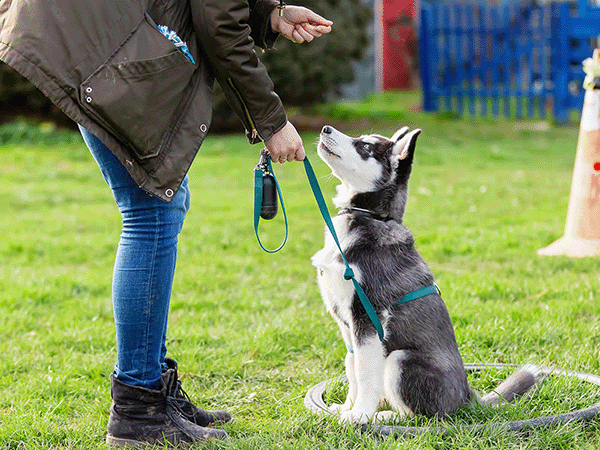
The Best Dog Trainers in the United States of 2026
This is a list of the top dog trainers in the United States, based on votes from the Sniffspot community and the general public.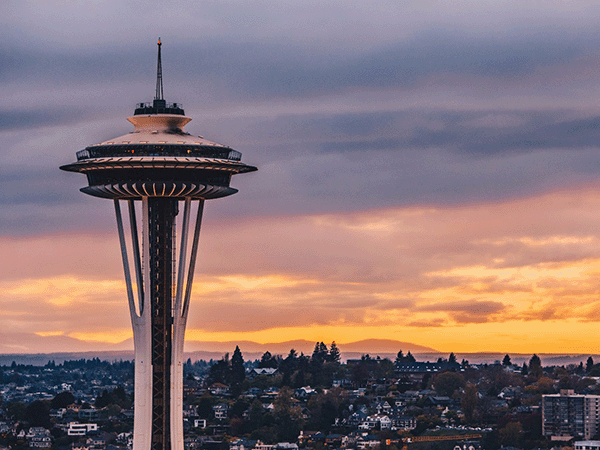
The Best Dog Trainers in Seattle, WA of 2026
This is a list of the top dog trainers in Seattle, WA, based on votes from the Sniffspot community and the general public.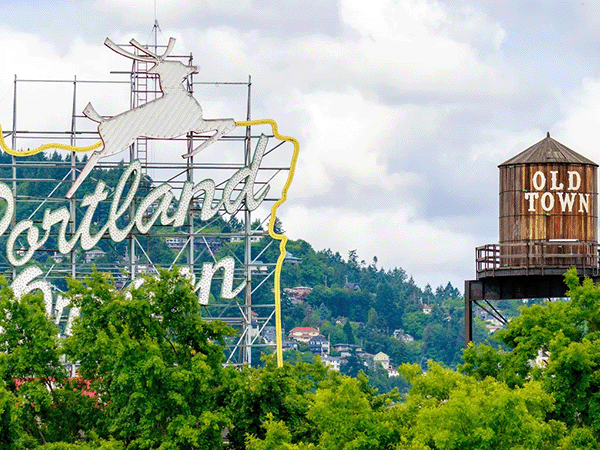
The Best Dog Trainers in Portland, OR of 2026
This is a list of the top dog trainers in Portland, OR, based on votes from the Sniffspot community and the general public.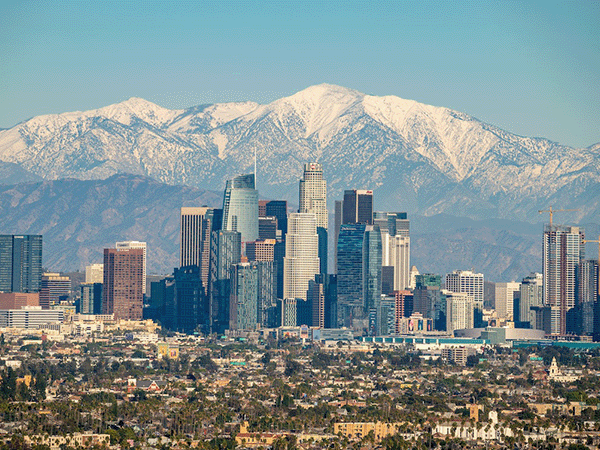
The Best Dog Trainers in Los Angeles, CA of 2026
This is a list of the top dog trainers in Los Angeles, CA, based on votes from the Sniffspot community and the general public.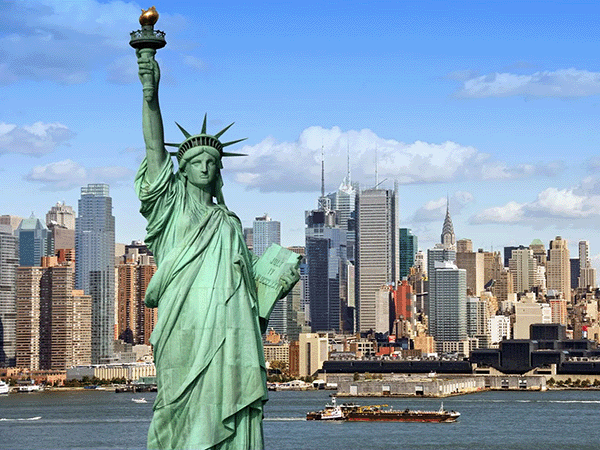
The Best Dog Trainers in New York, NY of 2026
This is a list of the top dog trainers in New York, NY, based on votes from the Sniffspot community and the general public.
City dog parks guides

Top 10 Indoor Dog Parks: A US Guide
Looking for a space to play with your dog no matter what the weather’s like outside? Look no further than our list of the best indoor dog parks in the United States! These climate-controlled spaces are growing in popularity as pet ownership increases throughout the country. As a bonus, many of them also offer dog training, boarding, grooming, or daycare services on the premises.

Best Dog Fields in the US: 25+ Wide-Open Spaces for Your Pup to Run Free
The best dog fields in the US offer something that traditional enclosed parks simply can't match: acres of open space where your pup can truly stretch their legs and run at full speed. From Colorado's 470-acre prairie meadows to Tennessee's award-winning "Outback," these wide-open spaces allow dogs to roam, explore, and exercise naturally while engaging instincts that cramped urban parks suppress.

Best Dog Parks in the US: Ultimate Guide to Public & Private Off-Leash Adventures
Is your pup giving you those pleading "let me run free" eyes? Whether you're a new dog parent or a seasoned pro looking for fresh adventures, finding the perfect off-leash paradise for your furry friend can feel ruff! From sun-soaked California beaches where your water-loving lab can make a splash to mountain trails in Vermont where your adventure buddy can chase every scent, we've sniffed out the 15 best dog parks across America.

Dog Parks Near Me: Las Vegas Edition
Looking for the perfect dog park near me in Las Vegas? You're in luck! This guide explores all the best options for your pup, from public dog parks to private dog parks near me on Sniffspot. We'll help you find the ideal spot for playtime, socializing, and fresh air. Plus, we'll cover essential etiquette and safety tips to ensure a happy visit for everyone. Get ready for some tail-wagging fun!

Top Sniffspot Locations: Find the Perfect Dog Park
Looking for the perfect dog park? Whether you need a wide-open public space or a private, fenced-in spot, this guide will help you find the best dog parks across the US. We'll cover top-rated public parks, the perks of private dog parks, and even explore Sniffspot locations – giving your pup a safe and fun place to play. Ready to find your dog's new favorite spot? Let's go!

Sniffspot: Portland's Best Private Dog Parks
Ready to discover Portland's best dog parks? Whether you're looking for a public park or the unique experience of a private Sniffspot, this guide has you covered. We'll help you find the perfect spot for your pup, with tips on what to bring, how to prepare, and even understanding dog body language. Plus, we'll explore some top Portland dog parks, including public and Sniffspot options, so you can plan your next dog-friendly adventure in the City of Roses.
Portland Dog Parks: Public & Private Options
This page is about public city dog parks and also includes Sniffspot private dog parks. Sniffspot is the largest network of private dog parks for rent in the world!
Small Dog Park Guide: Tips for Finding the Perfect Spot
Finding the perfect dog park for your small breed can be ruff! Big dog parks can be overwhelming, even dangerous, for little pups. This comprehensive guide helps you sniff out the best small dog parks for your pint-sized companion, covering everything from essential safety checklists to top recommendations for small dog parks across the US—including both public spots and private dog parks.
Dogs breeds

German Shepherd Guide: Best Family Dog? Truth from 9K Owners
The German Shepherd Dog (GSDs) are known for their intelligence, loyalty, and striking appearance. They're also incredibly versatile, excelling as working dogs and devoted family companions. This guide covers everything you need to know about GSDs, from understanding their unique traits and rich history to practical advice on training and care. So, whether you're a seasoned GSD owner or just starting your research, let's explore this remarkable breed together.

Best Dog Fields in the US: 25+ Wide-Open Spaces for Your Pup to Run Free
The best dog fields in the US offer something that traditional enclosed parks simply can't match: acres of open space where your pup can truly stretch their legs and run at full speed. From Colorado's 470-acre prairie meadows to Tennessee's award-winning "Outback," these wide-open spaces allow dogs to roam, explore, and exercise naturally while engaging instincts that cramped urban parks suppress.

Labrador Retriever: America's Best Family Dog? Owner Truth
Discover the Labrador Retriever, a breed celebrated for its playful nature, affectionate temperament, and trainability. Labradors are known for their friendly demeanor and adaptability, making them perfect family companions and versatile working dogs. As one of the most popular types of retrievers, Labs are ideal companions for various lifestyles and are recognized by the American Kennel Club (AKC) as an excellent breed for families.

Golden Retriever Advice: The Complete Owner's Guide
Golden Retrievers: they're gorgeous, playful, and incredibly popular. But before you welcome one into your home, you need the right golden retriever advice. This guide draws on the wisdom of nearly 10,000 Golden Retriever owners, offering practical tips for caring for these affectionate dogs. From understanding their high energy levels to mastering grooming and training, we'll cover everything you need to know. So whether you're already a devoted Golden parent or just starting your research, get ready to learn how to give your furry friend the best possible care.

Are American Staffordshire Terriers Good for First-Time Owners: Complete Guide
Think American Staffordshire Terriers are tough? Think again. While their muscular build might intimidate some, these dogs are known for their playful and loyal personalities. This guide draws on the experience of nearly 10,000 AmStaff owners to reveal the truth about this often misunderstood breed. Want to learn more about caring for an American Staffordshire Terrier? You're in the right place.

Australian Shepherd Facts: Breed Info & Care Guide
Discover the Australian Shepherd, an AKC breed celebrated for its trainable, playful, and affectionate nature. Despite its name, the Australian Shepherd is actually a native breed to the United States, originally developed to breed on farms and ranches. Considered a medium dog, Australian Shepherds were bred for herding beginning in the 1950s. As one of the high-energy breeds, Aussies are known for their boundless energy and need for regular exercise, including aerobic exercise.

Essential Husky Facts for Owners: Breed Guide
Discover the Siberian Husky, a breed celebrated for its curious, intelligent, and loyal nature. Considered a medium-sized dog, Siberian Huskies were originally bred in Russia for sledding, beginning in the early 20th Century. Today, they're one of the most popular active breeds in North America.










